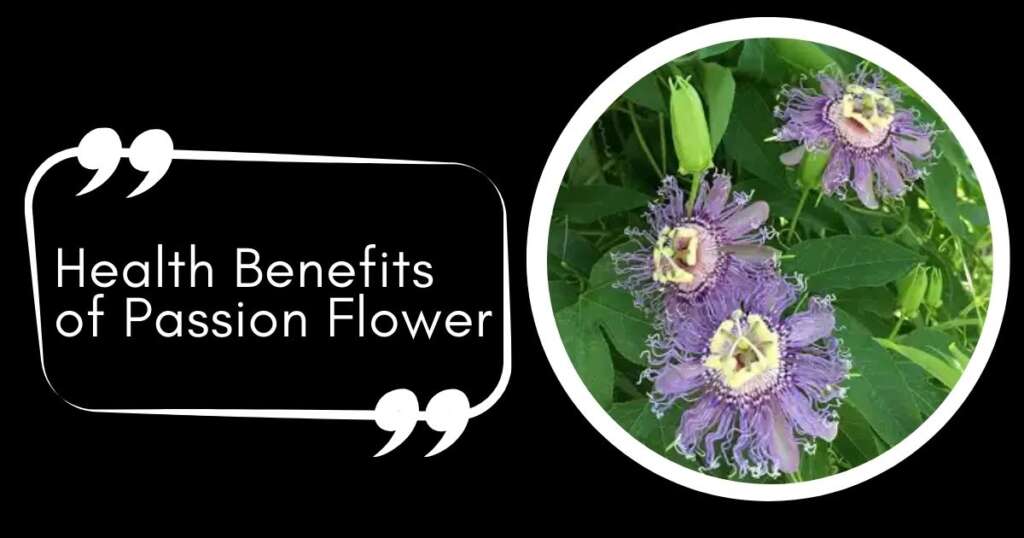Passion Flower – Health Benefits, Uses and Important Facts
Passion flower, a captivating plant with exotic blooms, has enthralled gardeners and wellness enthusiasts alike. But there’s more to this botanical beauty than meets the eye. This comprehensive guide delves into every facet of passion flower, exploring its cultivation as a vine or climber, the uses and potential side effects of its tea and extract, the symbolism behind its unique flowers, and even how to grow it from seed. Whether you’re a seasoned gardener, a tea lover, or simply curious about this intriguing plant, prepare to uncover the secrets of the versatile passion flower.
Passion flower, known by many names around the world, has long been celebrated for its unique beauty and potential health benefits. This article provides an in-depth look at the passion flower, exploring its origins, uses, and significance through a series of questions and answers.
What is Passion Flower?
Passion flower, scientifically known as Passiflora, is a genus of about 550 species of flowering plants, the most famous being Passiflora incarnata. Known for its intricate and striking blooms, the passion flower is a perennial vine that can grow in various climates. It’s widely recognized for its ornamental beauty and its use in traditional and modern medicine. The plant produces a fruit called passionfruit, which is also enjoyed for its unique flavor.
When Was Passion Flower First Discovered?
The passion flower was first discovered by Spanish explorers in the 16th century during their travels in South America. It was named “passion flower” because its intricate flowers were thought to symbolize the Passion of Christ, with various parts of the flower representing different aspects of the crucifixion. This religious symbolism was first noted by Spanish Christian missionaries who saw it as a sign of divine approval of their endeavors.
Where Does Passion Flower Grow?
Passion flower is native to the Americas, particularly the southeastern United States, Central America, and South America. It thrives in warm, tropical, and subtropical climates and can be found in various habitats, including forests, fields, and riverbanks. Today, passion flower is cultivated around the world, including in parts of Europe and Asia, for both its ornamental and medicinal value.
Who Uses Passion Flower?
Passion flower is used by a wide range of people across different cultures for various purposes. Herbalists and practitioners of traditional medicine often use it for its sedative and calming properties. Gardeners and plant enthusiasts grow it for its ornamental beauty, and it is also enjoyed by those who appreciate the unique taste of passionfruit. Additionally, modern medicine has begun to explore the potential health benefits of passion flower extracts, incorporating them into dietary supplements and natural remedies.
Why is Passion Flower Important?
Passion flower is important for several reasons:
- Medicinal Uses: It has a long history of use in traditional medicine to treat conditions such as anxiety, insomnia, and nervous disorders.
- Ornamental Value: Its striking and complex flowers make it a popular choice for gardens and decorative purposes.
- Cultural Significance: The plant holds religious and cultural symbolism, particularly in Christianity, where it represents the Passion of Christ.
- Nutritional Value: The fruit of some passion flower species, particularly Passiflora edulis, is consumed for its nutritional benefits and unique flavor.
Whose Health Can Benefit from Passion Flower?
Passion flower can benefit the health of individuals experiencing:
- Anxiety and Stress: Studies have shown that passion flower extract can help reduce symptoms of anxiety and promote relaxation.
- Insomnia: The plant’s sedative properties make it a popular natural remedy for improving sleep quality and treating insomnia.
- Menopausal Symptoms: Some research suggests that passion flower may help alleviate menopausal symptoms such as hot flashes and mood swings.
- Attention Deficit Hyperactivity Disorder (ADHD): There is some evidence to suggest that passion flower may help manage symptoms of ADHD, although more research is needed.
Unique Facets of Passion Flower
Botanical Characteristics:
- Complex Flowers: Passion flower blooms are known for their intricate structure, with petals, sepals, and corona filaments arranged in a unique pattern that attracts pollinators like bees, butterflies, and hummingbirds.
- Vining Growth: The plant is a fast-growing vine, often using tendrils to climb and spread, making it ideal for trellises and garden walls.
Cultural Symbolism:
- Christian Symbolism: The flower’s various parts are often interpreted as symbols of the Passion of Christ, with the tendrils representing the whips used in the flagellation, the ten petals and sepals representing the apostles (excluding Judas and Peter), and the radial filaments representing the crown of thorns.
- Historical Use: Native Americans and early European settlers used passion flower in traditional remedies, appreciating its calming effects.
Culinary Uses:
- Passionfruit: The fruit of certain species, such as Passiflora edulis, is enjoyed for its sweet-tart flavor and is used in juices, desserts, and culinary dishes around the world.
Health Benefits of Passion Flower
Anxiety Reduction:
- Calming Effects: Passion flower has been shown to have anxiolytic properties, helping to reduce anxiety and promote a sense of calm. This is thought to be due to its ability to increase levels of gamma-aminobutyric acid (GABA) in the brain, which lowers brain activity and helps you relax.
Sleep Improvement:
- Natural Sedative: The plant’s sedative properties make it a popular natural remedy for improving sleep quality and treating insomnia. Studies have found that passion flower can help increase overall sleep time and reduce the time it takes to fall asleep.
Pain Relief:
- Analgesic Properties: Passion flower may also have analgesic effects, helping to relieve pain and discomfort from conditions like headaches and muscle cramps.
Menopausal Support:
- Symptom Relief: Some research suggests that passion flower may help alleviate menopausal symptoms such as hot flashes, mood swings, and sleep disturbances, providing a natural alternative to hormone replacement therapy.
Intake Limits of Passion Flower
Recommended Dosage:
- Supplements: For anxiety and sleep disorders, passion flower supplements are typically taken in doses of 200-400 mg per day. It’s important to follow the manufacturer’s instructions or consult a healthcare provider for personalized advice.
- Teas and Tinctures: Passion flower tea can be made by steeping 1-2 grams of dried herb in hot water, and it is generally safe to drink up to three times a day. Tinctures should be taken according to the recommended dosage on the product label.
Potential Side Effects:
- Drowsiness: Because of its sedative effects, passion flower may cause drowsiness. It’s advisable to avoid operating heavy machinery or driving after taking it.
- Interactions with Medications: Passion flower can interact with certain medications, including sedatives, blood thinners, and antidepressants. It’s important to consult with a healthcare provider before using passion flower if you are taking any medications.
- Pregnancy and Breastfeeding: The safety of passion flower during pregnancy and breastfeeding is not well established. Pregnant and breastfeeding women should avoid using it without consulting a healthcare provider.
Conclusion
Passion flower, with its beautiful and complex blooms, offers a range of benefits from ornamental beauty to potential health advantages. Known for its calming and sedative properties, it has been used for centuries to alleviate anxiety, improve sleep, and support overall well-being. However, it is important to use passion flower responsibly, adhering to recommended dosages and being aware of potential interactions and side effects. Whether enjoyed as a tea, supplement, or garden plant, passion flower continues to captivate and benefit those who appreciate its unique qualities.



